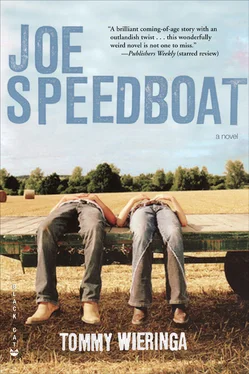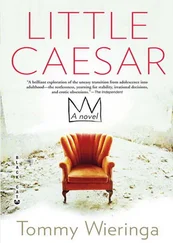‘He doesn’t really think this is the Nile, does he?’ Engel asked.
‘Rhine, Nile, same-same,’ Joe imitated his stepfather.
‘If you look at it philosophically, I guess,’ Engel said.
‘Didn’t he ever have geography at school?’ Christof asked.
‘He can’t point to Cairo in the atlas. He doesn’t know exactly where he is right now. And I don’t think he cares much, really.’
Silent with incomprehension, we looked at the phenomenon that was Papa Africa, pencil tucked behind his ear, plucking at his moustache as he walked the yard. The boat’s hull had now been painted red right up to the waterline, the rest was white. The mast still had to be raised and he was waiting for the sail, which Regina was sewing from stretches of canvas. The maiden voyage would be held in late August, and Regina wanted to throw a party at the wharf that day. She had big plans; she wasn’t going to let this chance for attention and admiration go to waste.
The day itself was coming up fast, but I had a bad feeling about the whole thing. After that weekend Joe, Engel and Christof would be leaving, classes started in September and I would remain behind in the realm of the dead. With a briquette press. I had truly been giving that thing hell, pressing far more briquettes than the drying racks could hold.
‘With so many of them the price will go down,’ Pa said.
Ma heard him say that. She pursed her lips, her arms folded across her chest.
‘Twenty-five is what I’ll give him from now on,’ Pa said, apologetic but determined. ‘Twenty-five is still a good price. When you’ve got overproduction, the price goes down, that’s the way it is everywhere.’
‘You have to keep your word,’ Ma said.
‘Well then he shouldn’t make so many of them. If you don’t have a lot of something you pay more for it, and if you’ve got a lot you pay less. Ask anyone.’
‘He’s your son.’
‘He just spends it all at Waanders’ anyway.’
Whatever the case, from that day on I got twenty-five for fifty briquettes and Ma made up the difference from her housekeeping money. And indeed, most of it I brought to Waanders’. Waanders’ roadhouse had the advantage of being along the national highway, outside the village, which made a difference in both clientele and atmosphere. It was better than the Sun, where the mood was often, how shall I put it, testy , the sleeping dogs there sometimes woke up and busted right out of the kennel. The Little Red Rooster, on the other hand, was more like a bingo parlour for old people, you only went there for wedding parties or to get in out of the rain. Waanders’ was the best. Trucks and cars stopped there with people I’d never seen before, which gave me hope, the way a certain kind of woman derives hope from an influx of enemy soldiers.
An example.
‘What will it be for the gentlemen?’ the barwoman asks a truck driver who comes in spreading the smell of warm asphalt.
He has his little boy with him, his son who’s allowed to ride along in the cab today.
‘What do you want?’ the man asks the boy in a voice you wouldn’t expect from him. He’s wearing mules with white socks.
‘A Coke,’ the boy says.
‘And something to eat?’
‘French fries. With mayo.’
‘French fries for the boy and I’ll have. . a gravy-roll sandwich. Heavy on the mustard.’
‘I’ll give him a little salad along with his fries,’ the barwoman says. ‘For the vitamins. You want anything to drink?’
‘Yeah, a Coke for me too.’
OK, maybe it’s not the greatest example, but things sometimes really do happen at Waanders’. At the weekend they have live music and Ella Booij, the barwoman, is your girlfriend as long as you pay your bill. She has the professional gung-ho of a go-go dancer, but as soon as she gets to the kitchen you know that smile falls from her face like an old scab. She’s not from around here. She comes to work from somewhere else around noon, driving a white Mazda automatic, and she goes back there when her shift is over. No one knows whether she has a family, she doesn’t look like she loves anyone in this world. I appreciate it that she doesn’t act nicer to me than she is.
She brings the truck driver with the white socks and the little boy two glasses of Coke, one in each hand. They’re sitting over by the window. Out on the highway a truck goes screaming past.
‘Good thing they’re putting in that E981,’ the driver says.
Ella looks outside, where the sun is making everything shiver.
‘Yeah, good thing,’ she says.
‘The way it is now, it’s getting out of hand. The question, of course, is how it will affect you folks.’
The truck driver looks at Ella, hoping to hear her opinion on the E981 that will connect this neck of the woods with Germany.
‘You never know how it will go with those sound barriers,’ the man continues. ‘Whether you’ll end up on the front of it or the back, that makes all the difference, right?’
‘We don’t have much to say about it.’
‘No, I guess not, no.’
‘Wouldn’t mind, though. .’
‘But that’s not how it works.’
Fifteen minutes later the gravy rolls and fries arrive. Contented, father and son leave Waanders’ and continue their circle around the sun.
For the time being at least, Lomark’s future added up to little more than the code name ‘E981’. I’d read about it in the paper; it was a plan that deserved our attention. My impression was that some people were enthusiastic about it because they thought a four-lane would bring the village economic prosperity, but the general reaction was a shrug. In any case, the old road to Germany wasn’t enough anymore, it was choked with a rising tide of vehicles. No one was thinking about reducing the number of cars, of course, only about widening the road. MY SPORT IS TRANSPORT I read on the bumper of one truck, and WITHOUT TRANSPORT EVERYTHING PILES UP.
My favourite was the sticker saying I ♥ ASPHALT, which had been pretty much the motto of every government since World War II, and so the asphalt came pouring in. In stupefying quantities. Joe was right, the world ran on kinetic energy. ‘The greatest minds in the world are working on that,’ he said, ‘and don’t ever forget it. Basically, the combustion engine hasn’t changed in the last hundred years; what they’re working on now is how to refine it, how to make a car run as economically as possible with the lowest possible emissions.
‘The automobile is being perfected all the time, but in a way that keeps it affordable for everyone. That’s the miracle of our times: that we can rocket down the road for next to nothing. But don’t believe in anyone who calls that progress. There’s no such thing as progress. Only motion. That’s the great claim of the twentieth century, that we can move. We’d rather surrender our right to vote than give up our cars. So if those environmentalists really want to change something, they’ll have to come up with something better. And there isn’t anything better.’
The route the E981 would follow hadn’t been staked out yet; every once in a while the subject came up at Lomark Town Council meetings, but the questions posed were as insipid as the answers. People just don’t deal very well with threats that lie too far in the future.
The day Papa Africa’s felucca was launched, Regina Ratzinger’s party gown got more attention than the whole damned ship. Someone called it an ‘Arab wedding dress’. It was a sort of intense blue, with mysterious patterns embroidered on it in gold and silver thread. A pair of shiny slippers poked out from beneath the hem. She was wearing a goodly amount of makeup, and the sequins on her headscarf shimmied as she welcomed the guests.
Читать дальше












